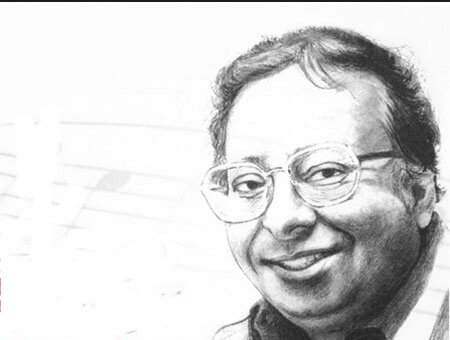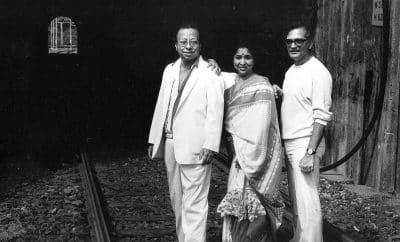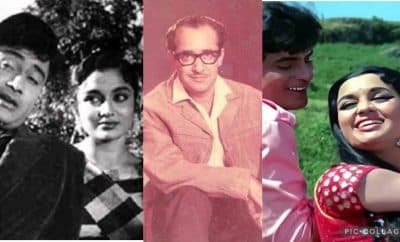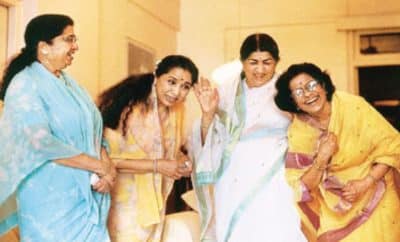Legends
A Revolutionary Music Director – R. D. Burman

If you are a Bollywood music fan then it is not possible that you have not heard about this music director who is one of the most significant directors in Hindi cinema. Yes it is Rahul Dev Burman famously known as R. D. Burman and also as Pancham Da.
Burman was born on 27th June 1939 to the great composer and singer Sachin Dev Burman and Meera Dev Burman who was a lyricist in Kolkata. Coming from a musical background, music was there in Burman’s blood and unlike anybody it was an inheritance for him and not an option. Burman got involved with music from a very early age and started composing music. Records say that he composed his first song when he was nine years old. It was ‘Aye meri topi palat ke aa’ which his father featured in the film Funtoosh (1956). It is also said that the tune of the song ‘Sar jo tera chakraye’ was composed by him when he was a child which is again used by his father in the film Pyaasa (1957).
To attain perfection, Burman received training under Ali Akbar Khan (sarod) and Samta Prasad (tabla), in Mumbai. In the beginning of his musical journey he assisted his father in movies like Chalti Ka Naam Gaadi (1958), Kaagaz Ke Phool (1959), Tere Ghar Ke Samne (1963), Guide (1965) and Teen Devian (1965). Not only this he is the one who played mouth organ in the song ‘Hai apna dil to awaara’ in the movie Solva Saal (1958).
His first break as an independent music director came with the movie Chhote Nawaab (1961) produced by Mehmood. Next movie for Burman was Teesri Manzil (1966) produced by Nasir Hussain. This movie and its music became a great hit and proved to be the turning point in Burman’s life. It was Majrooh Sultanpuri who recommended Burman to Hussain. So impressed Hussain was that Burman and Sultanpuri worked together for many of Hussain’s projects like that of Baharon Ke Sapne (1967), Pyar Ka Mausam (1969) and Yaadon Ki Baaraat (1973). Meanwhile Burman’s music in Padosan (1968) also became a blockbuster.
The road ahead was leading towards the destiny of fame and success. During 1970s Burman established himself as a renowned director composed music which became chartbusters on the silver screen. Kati Patang (1970) proved to be a musical hit that year and songs like ‘Yeh jo mohabbat hai’ and ‘Yeh shaam mastani’ became immediate hits. Songs like ‘Dum maro dum’ from the movie Hare Rama Hare Krishna (1971), music of Amar Prem (1972) including ‘Raina beeti jaye’ crooned by Lata Mangeshkar, Helen starrer ‘Piya tu ab to aaja’ from the movie Caravan (1971), are considered to be the epic numbers of Hindi cinema.
Then there was rush of movies like Seeta aur Geeta, Mere Jeevan Saathi, Bombay to Goa, Apna Desh, Parichay, Aap ki kasam, Sholay, Aandhi which brought a lot of success in Burman’s life. After his father went into coma in 1975, Burman completed the music of the movie Milli (1975). After number of hit movies Burman received his first Filmfare award for the best music director category in the year 1981 for the movie Sanam Teri Kasam
At his last stage Burman composed music for the movie Ijaazat (1986) and the song ‘Mera kuch saamaan’ from the movie won Asha Bhosle and Gulzar National awards for best playback singer and lyrics respectively. In 1989 he gave music for Vidhu Vinod Chopra’s Parinda. He composed one more song during this period ‘Chhod ke na jaa’ which was sung Asha Bhosle and was screened in the movie Gang (2000). The music of the rest of the movie was composed by Anu Malik.
He died in 1994, but his music never died. He composed the melodious track of 1942 Love Story (1994) which was released only after his death and which won him the last Filmfare award. Burman’s experimentation with the music has proved to be the inspiration for the upcoming music directors. It was Burman who popularised rock music with the blend of disco in the Hindi cinema. Whether it is Jazz or experimenting with bamboo sticks or sand paper, Burman knew it all. In Bollywood there have been movies and songs ever since his death, dedicating to Burman and his music. In 1995, Filmfare founded Filmfare RD Burman Award for New Talent in his honour.
He has done many projects together with Mohammad Rafi, Kishore Kumar, Lata Mangeshkar and Asha Bhosle. After his separation with his first wife he got married to Asha Bhosle. Burman was influenced by Western, Latin music and many of his songs bear the testimony of the same. He has reformed Hindi music and has taken it to another level of popularity. He is still considered to be a turning point in Hindi music and his name is immortal in Bollywood with the music he has created to reach to the heart of audience.



